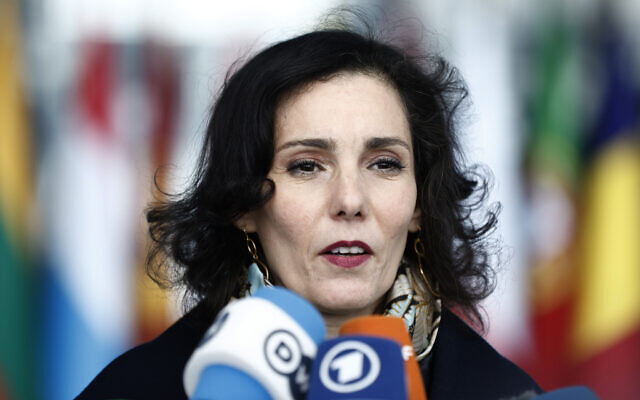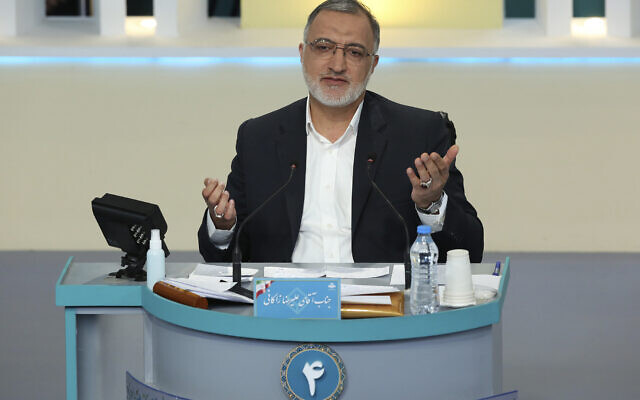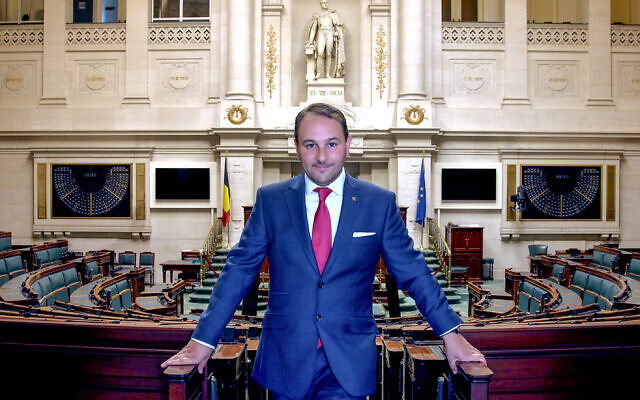Belgian official resigns, foreign minister on hot seat over junket for Tehran mayor
Pascel Smet steps down as top diplomat for Brussels Region state, saying taxpayers should not have funded trips; Hadja Lahbib urged to follow suit for granting visas to visitors

A senior Belgian official has resigned after coming under fire for hosting the mayor of Tehran and Russian municipal officials for an all-expenses-paid visit to Brussels.
The resignation of Pascal Smet, a state secretary who handles foreign affairs for Belgium’s Brussels Region state, has prompted critics to demand that federal State Secretary Hadja Lahbib resign as well over the incident. The foreign minister has so far resisted the calls.
Tehran Mayor Alireza Zakani and several municipal bosses from Russia were among the 300-odd participants of last week’s “Brussels Urban Summit,” an international conference hosted by the Brussels Region.
Zakani, a hardliner from the Society of Pathseekers of the Islamic Revolution political group, was among the mayors whom the region hosted on an all-expenses-paid sojourn, the Belgian media reported.
Smet, the state secretary for external relations and foreign trade of the Brussels government, defended inviting Zakani and other controversial visitors, for whom he helped obtain visas from Lahbib’s foreign ministry, according to Flemish news outlet De Morgen.
But on Sunday he said spending taxpayer money on the guests was wrong and done without his knowledge, leading him to resign.

“I find it unacceptable,” he said about the expenditure.
Lahbib has not publicly reacted to the calls for her resignation for granting the visas.
Belgium and Iran have sought to upgrade ties in recent weeks after years of tensions fell away in a prisoner swap.

Belgian citizen Olivier Vandecasteele was released from prison in Iran last month after more than a year behind bars. An aid worker, he had been sentenced in January to 40 years in prison and 74 lashes on multiple charges, including spying, that the Belgian foreign ministry said were trumped up. He was freed in exchange for an Iranian diplomat who had been imprisoned in Belgium in connection with a failed bomb plot.
Top Iranian officials have expressed interest in parlaying ties with Brussels into a stronger relationship with Europe.
Earlier this month, Lahbib told her Iranian counterpart Hossein Amir-Abdollahian that she hoped for closer ties between Iran and Belgium and between Iran and Europe. She also expressed a desire to visit Tehran at the right time.
Among those calling for her resignation is the center-right opposition party N-VA.
With media scrutinizing Belgo-Iranian relations, an N-VA lawmaker in federal parliament, Michael Freilich, has sought to draw attention to his longstanding campaign for the Belgian government to blacklist Hezbollah.
Belgium already bans the military wing of the Iranian proxy group. Freilich, an Orthodox Jew from Antwerp, is promoting legislation that would have the government extend those sanctions to the terror group’s political flank, which is a significant player in Lebanese politics.
He claims that the partial blacklist has turned Belgium into a hub for Hezbollah financial activity. The dichotomy between a political and military arm is “artificial,” Freilich told the Belgian PNWS news site.
Britain, Israel, the United States, Canada, Australia, New Zealand and the Netherlands have outlawed Hezbollah in its entirety, as have Serbia, Estonia, the Czech Republic and Guatemala. But the European Union, Belgium, France and many other countries in the EU and beyond have only partially banned the terror group.










